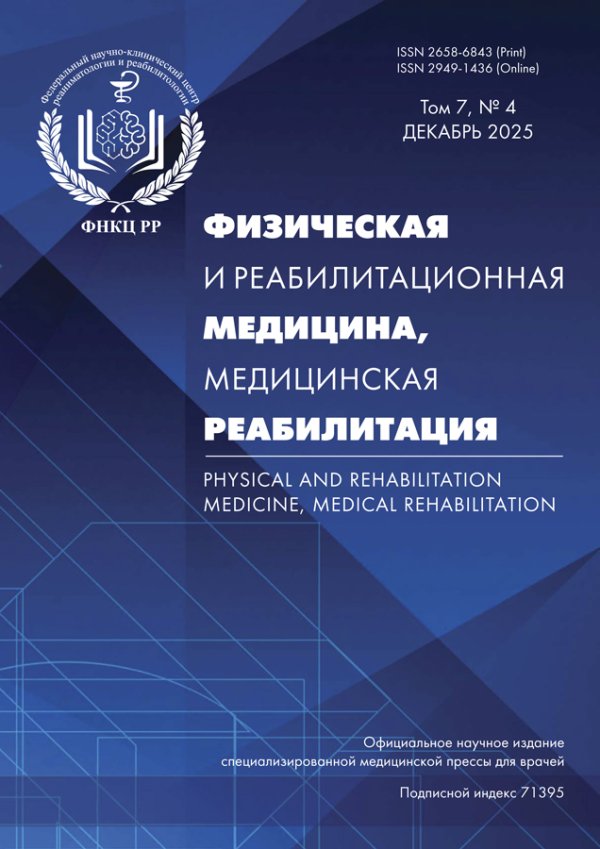Therapeutic hypothermia as part of a second-stage rehabilitation program for patients аfter ischemic stroke
- Authors: Torshin D.V.1, Shevelev O.A.1,2, Petrova M.V.1,2, Borisov I.V.1, Levin M.K.1, Mengistu E.M.2, Grechko A.V.1,2
-
Affiliations:
- Federal Research and Clinical Center of Intensive Care Medicine and Rehabilitology
- Peoples’ Friendship University of Russia
- Issue: Vol 7, No 1 (2025)
- Pages: 5-12
- Section: ORIGINAL STUDY ARTICLE
- URL: https://journal-vniispk.ru/2658-6843/article/view/288223
- DOI: https://doi.org/10.36425/rehab646048
- ID: 288223
Cite item
Full Text
Abstract
BACKGROUND: Implementation of new approaches to enhance the effectiveness of poststroke rehabilitation remains a pressing challenge. Promising experimental data on the neuroprotective effects of hypothermia and the beneficial outcomes of craniocerebral hypothermia in the acute phase of ischemic stroke formed the basis for this study.
AIM: To evaluate the effectiveness of craniocerebral hypothermia as part of a rehabilitation program at the early recovery phase of ischemic stroke.
MATERIALS AND METHODS: This single-center prospective pilot study included 95 patients (70 in the intervention group and 25 in the control group) who were at the early recovery phase of moderate ischemic stroke (National Institutes of Health Stroke Scale [NIHSS] score 5–15) with an activity limitation of 3–4 on the modified Rankin Scale. Both groups received standard rehabilitation therapy, while patients in the intervention group additionally underwent daily 90-minute craniocerebral hypothermia sessions for 10 days. Intracranial temperature in the frontal region was measured before and after treatment in both groups using noninvasive radiothermometry. Clinical effectiveness of the craniocerebral hypothermia was assessed using functional and cognitive scales.
RESULTS: Scale-based assessment revealed significant improvements in functional independence, mobility, and self-care ability.
CONCLUSION: Craniocerebral hypothermia may be recommended as part of an early rehabilitation program after ischemic stroke to improve treatment outcomes.
Full Text
##article.viewOnOriginalSite##About the authors
Dmitry V. Torshin
Federal Research and Clinical Center of Intensive Care Medicine and Rehabilitology
Author for correspondence.
Email: torshin.dmitrii@rambler.ru
ORCID iD: 0000-0002-0134-5284
SPIN-code: 1205-9474
MD, Cand. Sci. (Medicine)
Russian Federation, MoscowOleg A. Shevelev
Federal Research and Clinical Center of Intensive Care Medicine and Rehabilitology; Peoples’ Friendship University of Russia
Email: shevelev_o@mail.ru
ORCID iD: 0000-0002-6204-1110
SPIN-code: 9845-2960
MD, Dr. Sci. (Medicine), Professor
Russian Federation, Moscow; MoscowMarina V. Petrova
Federal Research and Clinical Center of Intensive Care Medicine and Rehabilitology; Peoples’ Friendship University of Russia
Email: mpetrova@fnkcrr.ru
ORCID iD: 0000-0003-4272-0957
SPIN-code: 9132-4190
MD, Dr. Sci. (Medicine), Professor
Russian Federation, Moscow; MoscowIlya V. Borisov
Federal Research and Clinical Center of Intensive Care Medicine and Rehabilitology
Email: realzel@gmail.com
ORCID iD: 0000-0002-5707-118X
SPIN-code: 7800-6446
MD
Russian Federation, MoscowMaxim K. Levin
Federal Research and Clinical Center of Intensive Care Medicine and Rehabilitology
Email: batterbin@yandex.ru
ORCID iD: 0009-0008-8631-9149
Russian Federation, Moscow
Elias M. Mengistu
Peoples’ Friendship University of Russia
Email: drmengistu@mail.ru
ORCID iD: 0000-0002-6928-2320
SPIN-code: 1387-7508
MD, Cand. Sci. (Medicine)
Russian Federation, MoscowAndrey V. Grechko
Federal Research and Clinical Center of Intensive Care Medicine and Rehabilitology; Peoples’ Friendship University of Russia
Email: avgrechko@fnkcrr.ru
ORCID iD: 0000-0003-3318-796X
SPIN-code: 4865-8723
MD, Dr. Sci. (Medicine), Professor, corresponding member of the Russian Academy of Sciences
Russian Federation, Moscow; MoscowReferences
- Shevelev OA, Butrov AV, Cheboksarov DV, et al. The pathogenetic role of cerebral hyperthermia in brain lesion. Clinical Medicine (Russian Journal). 2017;95(4):302–309. doi: 10.18821/0023-2149-2017-95-4-302-309 EDN: YPIAWZ
- Boyarintsev VV, Zhuravlev SV, Ardashev VN, et al. Characteristics of cerebral blood flow in the norm and pathologies in the course of craniocerebral hypothermia. Aerospace and environmental medicine. 2019;53(4):59–64. doi: 10.21687/0233-528X-2019-53-4-59-64 EDN: AKVOQV
- Gutsalyuk AG, Petrova MV, Borozenets KF, et al. Craniocerebral hypothermia in the acute period of ischemic stroke. S.S. Korsakov journal of neurology and psychiatry. 2023;123(12-2):43–48. doi: 10.17116/jnevro202312312243 EDN: MKAIPS
- Petrova MV, Shevelev OA, Yuriev MYu, et al. Selective brain hypothermia in the comprehensive rehabilitation of patients with chronic consciousness disorders. General Reanimatology. 2022;18(2):45–52. doi: 10.15360/1813-9779-2022-2-45-52 EDN: ECBUKD
- Jackson TC, Kochanek PM. A new vision for therapeutic hypothermia in the era of targeted temperature management: A speculative synthesis. Ther Hypothermia Temp Manag. 2019;9(1):13–47. doi: 10.1089/ther.2019.0001 EDN: QHDLRY
- Suponeva NA, Yusupova DG, Zhirova ES, et al. Validation of the modified Rankin scale in Russia. Neurology, neuropsychiatry, psychosomatics. 2018;10(4):36–39. doi: 10.14412/2074-2711-2018-4-36-39 EDN: SLWIKP
- Martin-Schild S, Albright KC, Tanksley J, et al. Zero on the NIHSS does not equal the absence of stroke. Ann Emerg Med. 2011;57(1):42–45. doi: 10.1016/j.annemergmed.2010.06.564
- Hage V. The NIH stroke scale: A window into neurological status. Nursing Spectrum. 2011;24(15):44–49.
- Shevelev OA, Petrova MV, Yuriev MYu, et al. Microwave radiothermometry in evaluating brain temperature changes (review). General Reanimatology. 2023;19(1):50–59. doi: 10.15360/1813-9779-2023-1-2129 EDN: CSPOOF
- Shevelev OA, Petrova MV, Saidov ShKh, et al. Neuroprotection mechanisms in cerebral hypothermia (review). General Reanimatology. 2019;15(6):94–114. doi: 10.15360/1813-9779-2019-6-94-114 EDN: MFDCOE
- Shevelev OA, Petrova MV, Mengistu EM, et al. Mechanisms of low-temperature rehabilitation technologies. Natural and artificial hypothermia. Physical and rehabilitation medicine, medical rehabilitation. 2023;5(2):141–156. doi: 10.36425/rehab345206 EDN: NOQORA
Supplementary files










